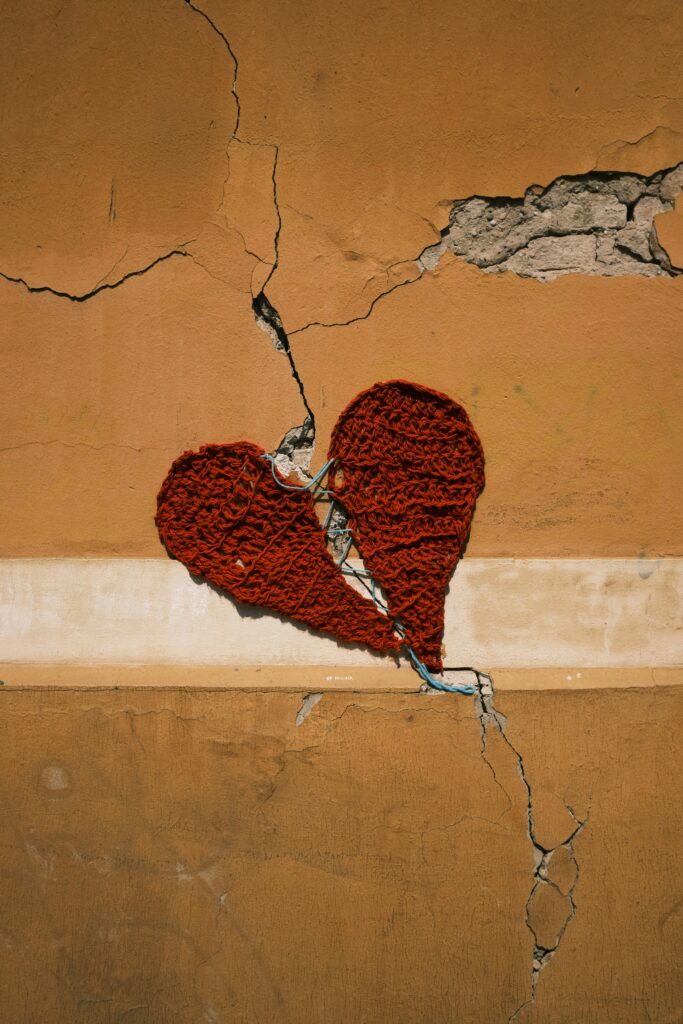By Dr Paula Davis
28 September 2025
“Lord my God, I called to you for help, and you healed me.” ~ Psalm 30:2
“Heal me Lord, and I will be healed…” ~ Jeremiah 17:14
“The most profound thing we have to offer our own children is our own healing.” ~ Anne Lamott

Photo by Diana Polekhina on Unsplash
The Myth of Time as Healer
We’ve all heard it said: “Time heals all wounds.” It’s what we tell the grieving widow, the betrayed spouse, the traumatized child. Just wait. It will get better. You’ll move on.
But what if this well-meaning advice is fundamentally flawed?
What if time alone doesn’t heal, but merely distances us from our pain, covering wounds without cleaning them?
From Transaction to Transformation
I was twenty-one, newly married, and searching for purpose and meaning. At a packed seminar on inner healing and deliverance, my husband and I sat desperate to be filled with the Holy Spirit. The teachings promised freedom from emotional wounds, trauma, and relational pain.
We followed every formula meticulously. Confess this sin. Pray these words. Claim this scripture. Renounce that influence.
It felt like God was a cosmic slot machine: insert the right behaviour, say the right words, and healing, blessings, and peace would come tumbling out. But what we got wasn’t a relationship; it was a transaction. And we were left feeling disillusioned.
This experience, one of many I’ll share throughout this blog, marked the beginning of my understanding that true healing isn’t about formulas or quick fixes.
Time passed. We followed Jesus faithfully, attended church, served in ministry. But my woundedness lingered. Deep down, I began to wonder: Why hadn’t God healed me? Was I doing something wrong? Did I not have enough faith?
I used to believe that time healed all wounds. But now I know the truth: Time alone doesn’t heal. Just as a deep physical injury needs cleaning, stitching, and careful tending, so do the wounds of the heart, mind, body, and spirit. Healing requires presence, not just passage of days.
Avoiding the Shortcuts
Theologian Robert Mulholland (2006) describes healing as a grace-filled transformation into the image of Christ. But too often, Christians are taught to bypass the pain:
Just forgive and move on. Give it to God. Don’t dwell on the past. Count your blessings instead.
These well-meaning phrases can unintentionally shut down the process of true healing. They offer an escape from discomfort, not an invitation to transformation. They reflect our cultural aversion to pain, even the necessary pain of growth.
The Bible speaks of four aspects of the self: mind, body, emotions, and spirit. Trauma can splinter each of these, leaving us disoriented and disconnected, even from God. Recovery, then, must address all four dimensions of our being. We need more than prayer, more than time, more than distraction, we need God’s presence within a safe space to grieve, question, and be restored.
The Pike in the Tank: When We Stop Hoping
Years ago, I came across a story that pierced my heart. Researchers placed a large northern pike into a glass tank with its favourite food, small minnows. Initially, it feasted easily. Then they inserted a sheet of glass between the pike and the minnows.
The pike continued to lunge at its prey but slammed into the invisible barrier. Again and again, it tried, only to be stopped by pain. Eventually, the pike gave up.
When the researchers removed the glass divider, something remarkable happened, or rather, didn’t happen. The minnows swam freely around the tank. But the pike no longer pursued them. It had learned that hope only brought pain.
I was moved when I first heard this story. Not just intellectually, but viscerally. Because I had become the pike.
Repeated blows to my spirit had trained me to stop trying. Somewhere deep inside, I believed nothing would change. My wounds would remain forever raw. Healing was for other people, not me.
The enemy of our souls loves this strategy: If he can’t destroy us, he’ll convince us to settle. He’ll whisper:
“Don’t risk it.”
“Don’t believe again.”
“Stay where it’s safe.”

But Jesus doesn’t leave us in the glass tank. He comes to restore what was lost.
In John 10:10, Jesus declares: “The thief comes only to steal and kill and destroy. I have come that they may have life and have it to the full.” This promise isn’t just about eternal life, it’s about abundant life now, even in the midst of our wounds.
Healing takes courage. It often begins not with a dramatic breakthrough, but with a whisper of hope:
When we dare to believe again after disappointment.
When we allow ourselves to grieve what was lost.
When we stop pretending that we’re fine and bring our honest pain into God’s presence.
God is not afraid of our wounds. He meets us there, not to shame or scold, but to gently lead us into life.
A Longing for Healing and Wholeness
“Time is a great healer,” we tell each other to provide comfort. But this well-meaning sentiment often fails to acknowledge a crucial truth: while physical wounds are visible and their healing progress can be tracked, wounds to the mind, soul, heart, and spirit remain hidden, sometimes even from ourselves.
For years, I couldn’t connect my anxiety, depression, and chronic anger to frozen, painful life-wounds that had never been properly addressed. These unhealed injuries silently shaped my responses, relationships, and resilience. Like water finding the path of least resistance, my emotional reactions flowed through channels carved by old pain.
Life-wounds block abundance. They limit our capacity to receive love, to trust, to hope. I longed for healing from past wounds that were still alive in the present. But a question nagged at me: Does God care about these inner injuries as much as our physical ones?
God’s Heart for Our Healing
The Bible contains many verses about healing. Here are just a few that have sustained me:
“I am the Lord who heals you” (Exodus 15:26).
“But I will restore you to health and heal your wounds,’ declares the Lord…” (Jeremiah 30:17).
“As a mother comforts her child, so I will comfort you…” (Isaiah 66:13).
“Jesus graciously welcomed them and talked to them about the kingdom of God. Those who needed healing, he healed” (Luke 9:10-11).
“Lord, you know how I long for my health once more. You hear my every sigh” (Psalm 38:9).
“Yes, I will bless the Lord and not forget the glorious things he does for me. He forgives all my sins. He heals me” (Psalm 103:2-3).
As I explored these passages, I discovered that humans are multi-dimensional beings. Wholeness and healing require a multi-faceted approach.
Matthew 4:23-25 says, “From there he went all over Galilee… He also healed people of their diseases and of the bad effects of their bad lives… People brought anybody with a sickness, whether mental, emotional, or physical. Jesus healed them, one and all.”
He healed complex beings like me, not just bodies, but souls, minds, and spirits too.
Mark 12:29-31 gives another clue about this complexity: “‘Love the Lord your God with all your heart and with all your soul and with all your mind and with all your strength.’ The second is this: ‘Love your neighbour as yourself.’ There is no commandment greater than these.”
This perspective illuminates that healing isn’t just about physical restoration. It’s about addressing the heart, soul, mind, and strength, the entirety of who we are. True healing invites us to love God, love others, and love ourselves with the fullness of our being. In that space of divine love, we find hope for wholeness and restoration.
Closing Thoughts
We are often told that time heals all wounds. But anyone who has lived through profound loss, betrayal, or trauma knows this isn’t always true.
Time may mute the sharp edges of pain, but it does not resolve what has been buried. Unattended wounds settle into the soul, shaping our beliefs, behaviours, and sense of self. They become silent narratives influencing how we view our worth, whom we trust, even how we perceive God.
True healing asks more of us than simply waiting. It invites us to turn toward our pain, to listen, and to feel what we’ve long avoided. Healing requires presence. Compassion. And courage.
Often, the first movement toward healing comes through tears. Not the polite tears we brush away quickly, but the deep, unbidden ones, the tears that surprise us, expose us, and sometimes undo us. These are the tears of the heart, rising from places words cannot reach.
They signal that something hidden is stirring, aching to be seen. Though we may fear them, such tears are not a sign of weakness, they are sacred. They soften the soul’s protective shell and become a gateway to tenderness, connection, and restoration.
In the stories ahead, we’ll explore how trauma affects not just our emotions but our entire being. We’ll uncover how unhealed wounds shape our thoughts, choices, and relationships. And most importantly, we’ll discover pathways to the healing God longs to bring, not because we’ve performed the right religious transaction, but because His very nature is to restore.
In the breaking open, something begins to shift. And that’s where we’re headed next.

Photo by Ante Gudelj on Unsplash
Declarations
• I declare that my wounds do not define me. • God is restoring every part of me: heart, soul, mind, and strength. • I declare that I will hope again. • God is with me in my pain, and He is making all things new. • I declare that I am not alone. • God walks with me through every valley, and His presence is my healing. • I declare that I receive God’s grace today. • His love empowers me to love Him, love others, and love myself.
Prayer
Father in Heaven, You see every part of me, my story, my scars, my longings, and my fears. Thank You that I am not beyond Your reach. You do not rush my healing, but You gently lead me toward wholeness. I bring You the parts of me that feel too broken, too tired, too afraid. Come, Holy Spirit, breathe life into what has felt numb, and light into what has been hidden. Restore what was stolen. Mend what was shattered. Teach me to love You with all of who I am, heart, soul, mind, and strength. I choose to trust Your presence even when I don’t understand Your timing. Let Your love be the ground I stand on, the truth I live by, and the grace that carries me forward. In Jesus’ name, amen!
Refection Questions
How have past wounds contributed to who I am today?
What indicators suggest that I am effectively healing or not healing from past emotional wounds?
What unhealthy coping mechanisms am I currently employing?
How effective are my current coping strategies?
To what extent do I genuinely believe in my current capacity for loving God with all my heart, soul, mind, and strength?
Journal Prompt
Write or draw a short prayer or reflection: What do I sense God whispering to my heart today? Let your pen move without censoring. See what flows out.
About the Author

Dr. Paula Davis, a clinical counsellor, supervisor and educator with three advanced degrees, specialises in trauma counselling, and before she retired, was a senior lecturer in counselling, designing and delivering curricula. Her book, “Eating Water, Drinking Soup: Finding Nourishment in the Deepest Pain” is available on request. With her husband, she delivers marriage programs internationally. In 2021, they published “A Safe Place: A Marriage Enrichment Resource Manual” available on online bookstores. Paula has published articles in peer-reviewed journals and speaks at venues in Australia and internationally.

